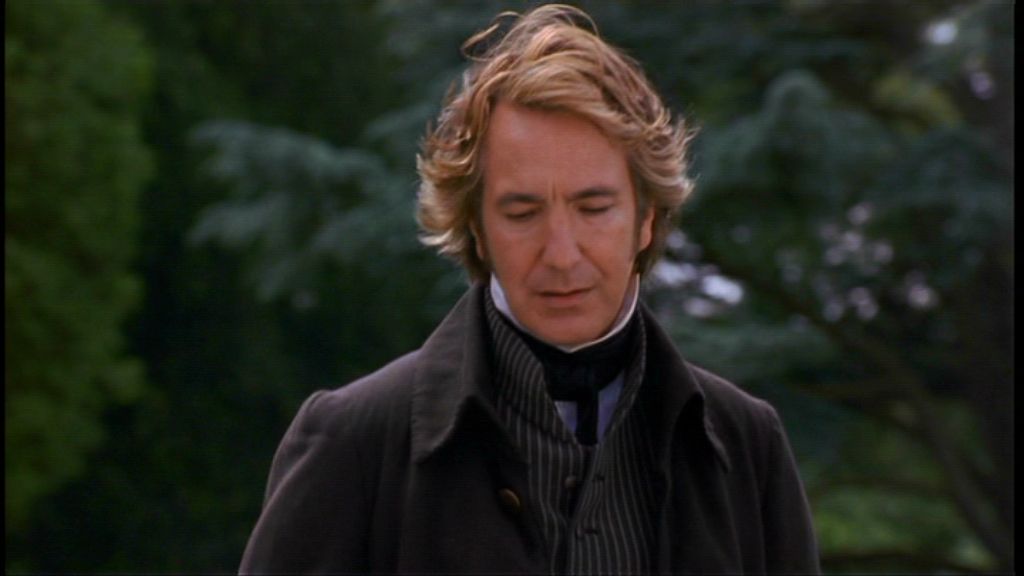Review: Sense and Sensibility (1995)
With the recent passing of the immensely capable actor, Alan Rickman, I thought it was high time that I saw him in the role of Colonel Brandon in the famous Jane Austen adaptation, Sense and Sensibility. I’ve long been familiar with Rickman’s two famous villain roles—as the German criminal mastermind Hans Gruber in Die Hard, and, my personal favourite, the outrageously vile Sheriff of Nottingham in Robin Hood: Prince of Thieves—and no one became their character in the Harry Potter series quite like Rickman became the dour Professor Snape. (More than the rest of the cast, Rickman’s is the voice I hear when I read Rowlings’ books.) In comparison to those two remarkable villains and the memorable Snape, Col. Brandon might seem like an unusual role for Rickman, since Brandon is one of the possible suitors and love interests of Marianne Dashwood (Kate Winslet), who is one of the two sister protagonists of Sense and Sensibility.
Marianne is the romantic, emotional sister; the older Elinor (Emma Thompson) is the sensible one. When Mr. Dashwood dies, the rules of inheritance determine that his property must pass to his son (James Fleet) and not his second wife (Gemma Jones) or her three daughters. Forced to live on a meagre allowance, Mrs. Dashwood and her daughters move into a small cottage provided by a relative. The only option for the two young women is to marry well (the third and youngest daughter is still of the age of hiding under library tables and climbing trees).
Enter Col. Brandon, their neighbour, a retired military man with a sad past. Unfortunately for the reserved Brandon, the dashing John Willoughby (Greg Wise) literally sweeps Marianne off her feet. Meanwhile, Elinor takes a liking to Hugh Grant’s incredibly befuddled Edward Ferrars—whether she cares to admit it or not—but Ferrars shy manner also suggests hidden motivations and concealed information. A lot of the film’s side humour is provided by Hugh Laurie’s Mr. Palmer, who can’t stand his chirping, bubbling wife (Imelda Staunton), and by the assertive yet genial Mrs. Jennings (Elizabeth Spriggs), who takes Elinor and Marianne to London.
The film, directed by Ang Lee (in his first non-Taiwanese production) from a screenplay by the actress Emma Thompson, helped spark the resurgence of Jane Austen in modern pop culture, along with the BBC TV adaptation of Pride and Prejudice starring Colin Firth as Mr. Darcy, which came out earlier the same year. (1995 also saw a movie adaptation of Persuasion.) Thompson’s adaptation keeps the pace moving and makes Austen’s novel easily accessible for audiences only familiar with modern—not Regency era—romantic comedies. Lee exercises his usual command of repressed emotions and evasive dialogue, and gives us some lovely idyllic English countryside scenes and nice domestic framings.
Roger Ebert said that Rickman in this film has “the speaking style of a sentimental hangman.” I admit that Rickman’s voice and mannerisms are not immediately charming, but we can turn to Snape for a clue to Rickman’s lasting appeal as a romantic figure, both in this film and in others, such as Love Actually. Unlike the rogish Willoughby who only projects fortitude, or Ferrars, who is privately honourable but comes across as dazed, Brandon is the sensible man. He’s so sensible, he might even appear to be boring, just as Snape, who Harry long thinks is a villain, is actually one of the true heroes of that series. Brandon is not dull, but he also, for certain reasons that come to light, cannot show his full admiration and desires. Col. Brandon is one side of the Rickman appeal: the oddly charming, reserved man of integrity. He’s the complete opposite of Rickman’s over-the-top Sheriff of Nottingham, yet nevertheless Rickman works in the role of reserved lover.
The rest of the cast is in mostly good form. Hugh Grant bumbles his way around to great effect, and Emma Thompson manages to make her Elinor very appealing, because of, and not in spite of, her reserved and prudent intelligence. In other words, she manages to avoid making her sister the “damp cloth” to Marianne’s spark, and instead mines a lot of dialogue with her dry wit. In fact, if anyone isn’t up to snuff, it’s the (admittedly very young) Kate Winslet who, while oozing the Romantic sensibility of her character, also can’t quite manage her few more serious moments. There is no doubt, however, that Thompson and Rickman are the most comfortable with the Regency language and costumes.
And so, even for a role I didn’t expect him to excel in, Alan Rickman will be missed.
8 out of 10
Sense and Sensibility (1995, USA/UK)
Directed by Ang Lee; screenplay by Emma Thompson, based on the novel by Jane Austen; starring Emma Thompson, Kate Winslet, Alan Rickman, Hugh Grant, Greg Wise, Harriet Walter, James Fleet, Emilie François, Hugh Laurie, Imelda Staunton, Elizabeth Spriggs, and Gemma Jones.
